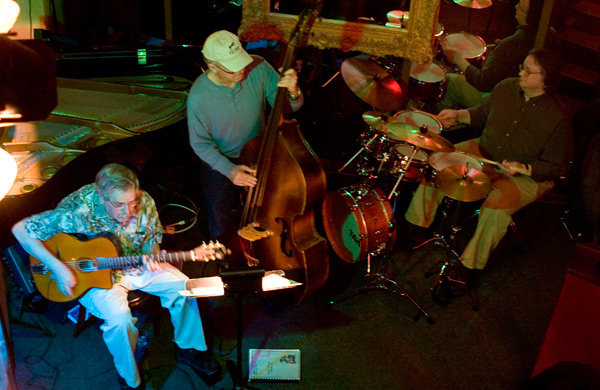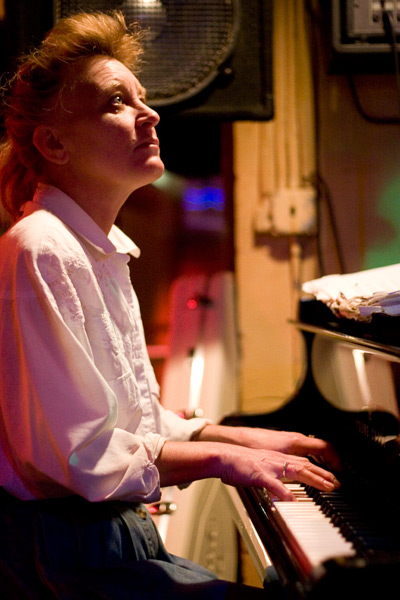 Guest guitarist Spencer Doidge joins All-Star members Byron Case on bass and Bruce Cole on drums. Guest guitarist Spencer Doidge joins All-Star members Byron Case on bass and Bruce Cole on drums.
Photo by Kai-Huei Yau.
|
SLIDESHOW:  |
Sights and sounds: The All-Star Jazz Jam. |
It’s Thursday night at Jo Federigo’s.
Upstairs, well-dressed patrons speak in hushed tones over food and wine. Downstairs, in the basement, a decidedly more raucous and eclectic crowd is just getting warmed up.
Thursday night at Jo Federigo’s is the All-Star Jazz Jam, an opportunity for everyone from jazz legends to shaky amateurs to try their hand at jazz improv with other local musicians and with the Jazz All-Stars, a trio consisting of stand-up bassist Byron Case, drummer Bruce Cole and pianist Barbara Dzuro.
Well, not quite everyone. Cole, the master of ceremonies, gives every musician who signs up a chance to prove his or her mettle. And if they’re not so good?
“Then we tell them to maybe go practice some more,” he says. “We don’t like to discourage anybody.”
“He’s very polite about it,” Case adds.
The jazz jam has been running here since 1974. It took a two-year hiatus in 1980 and wasn’t really going full steam again until 1990. Still, a 17-year streak is impressive, especially in a town not known for its jazz credibility.
Cole says the pool of musicians varies dramatically. Some
nights the bar is packed with people waiting to jam. Other
nights, like this one, there are only five or six.
The musicians who sign up have a variety of skill levels.
Some are classically trained or professionals. Others are
just enthusiasts. A few legends have passed through this dimmed
basement, including alto saxophone giant Richie Cole.
Tonight, the pool of musicians tonight is small. A couple of middle-age men and a sneaker-clad twenty-something sign up for the jam session.
The Jazz All-Stars open the evening with an hour-long set.
They dazzle the audience with their renditions of “Days of
Wine and Roses” and other jazz standards.
Spencer Doidge , a jazz guitarist, was invited to play here tonight
with the All-Stars. Though he’s only a guest, he manages
to seamlessly integrate himself into the band’s sound,
as if he were an All-Star veteran.
“It’s kind of a privileged place to play,” he says. “These are the best players in town.”
After the All-Stars wrap up their set, its time for the amateurs
to show their stuff. The next group is composed of musicians
randomly thrown together from the sign-up sheet. A drummer,
a pianist, a saxophonist, a bassist and a guitarist take the stage.
(Improv) really is the drug of choice for musicians. You don't always get high, but when you do, some say its better than sex.
-Bruce Cole, All-Stars drummer |
These musicians have never played together before, and some of
them are relative rookies with their instruments. On occasion,
they play as a coherent unit, moving fluidly from song to song.
Other times it's obvious they’re struggling to find their
sound: the drummer wants to sing but the pianist is playing too
loudly; the saxophonist squeaks in a failed attempt to hit a high
note; the guitarist is itching for a solo but keeps getting overpowered
by other musicians. At the very least, it’s fascinating
to watch.
Guitarist Kahli Burke is among the hodge-podge of musicians this evening. Like many improvisers and jazz musicians, Kahli is largely self-taught.
“I have taken lessons but I’ve also done a lot of self-study,” he says. The best place for him to study is here, at the Jazz Jam.
“This place has been a good experience in being able to play jazz standards,” he says. “It’s kind of an educational experience as well as a chance to perform.”
Many improv musicians have little or no classical training. Cole, for instance, is a drum instructor but is completely self-taught. Technical prowess, while important, is not the ultimate measure of a good improviser.
“Some improv musicians never learned to read music,” he said. “But there are plenty of orchestral musicians who can’t play unless something is in front of them.”
He says that in improv, having a good ear is far more important than technical prowess.
“Listening: that’s the key factor,” he said. “Somebody that isn’t technically good can still sound good.”
 Veteran jazz pianist and Jazz All-Stars member Barbara Dzuro says she loves the emotive nature of jazz improvisation: "You play what you feel." Veteran jazz pianist and Jazz All-Stars member Barbara Dzuro says she loves the emotive nature of jazz improvisation: "You play what you feel."
Photo by Moriah Balingit.
|
Jessie King, a jazz pianist who signed up for improv this evening, says that a good improviser is more than just a good musician.
“You have to be able to think fast and
phrase everything well … but more than that you have to have a passion and a soul for it,” he said.
Dzuro, who has played piano with the All-Stars for nine years, was originally a classical musician. But she found jazz and improv to be more emotive and cathartic.
“With classical music, you have to play every note on the page,” she said. “With improv, you’re not bound by anything. You’re playing what you feel.”
King says he likes the spontaneity of improvising. He compared it to a mandala, an intricate Tibetan Buddhist sand painting that is destroyed shortly after it is created to demonstrate the finite nature of human existence.
“Music, and art in general, is all about creating beauty,” he says. “With improv, it’s in the here and the now, like the Buddhist sand painting.”
For Bruce and other musicians, improv is more than just a style of music; it’s the ultimate euphoria.
“(Improv) really is the drug of choice for musicians,” he said. “You don’t always get that high, but when you do, I’ve heard some say it’s better than sex.” | 



